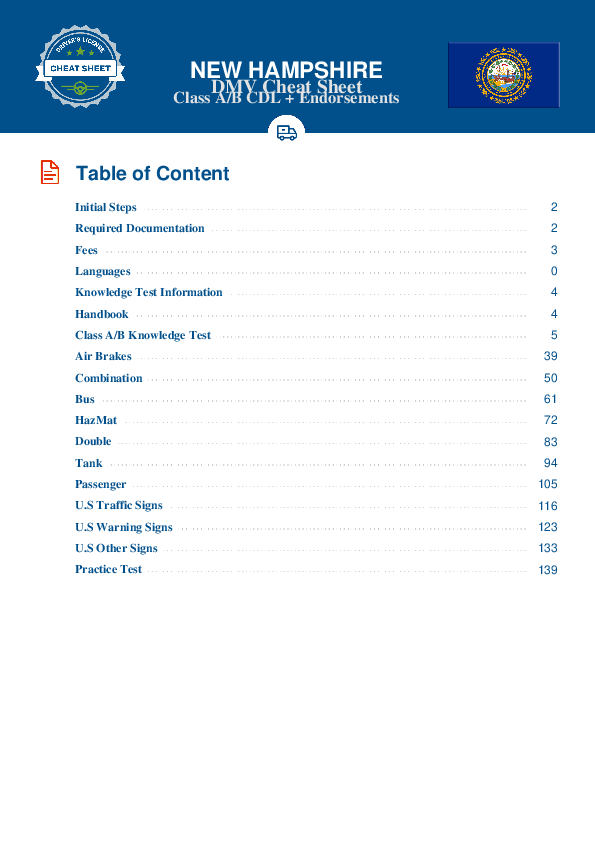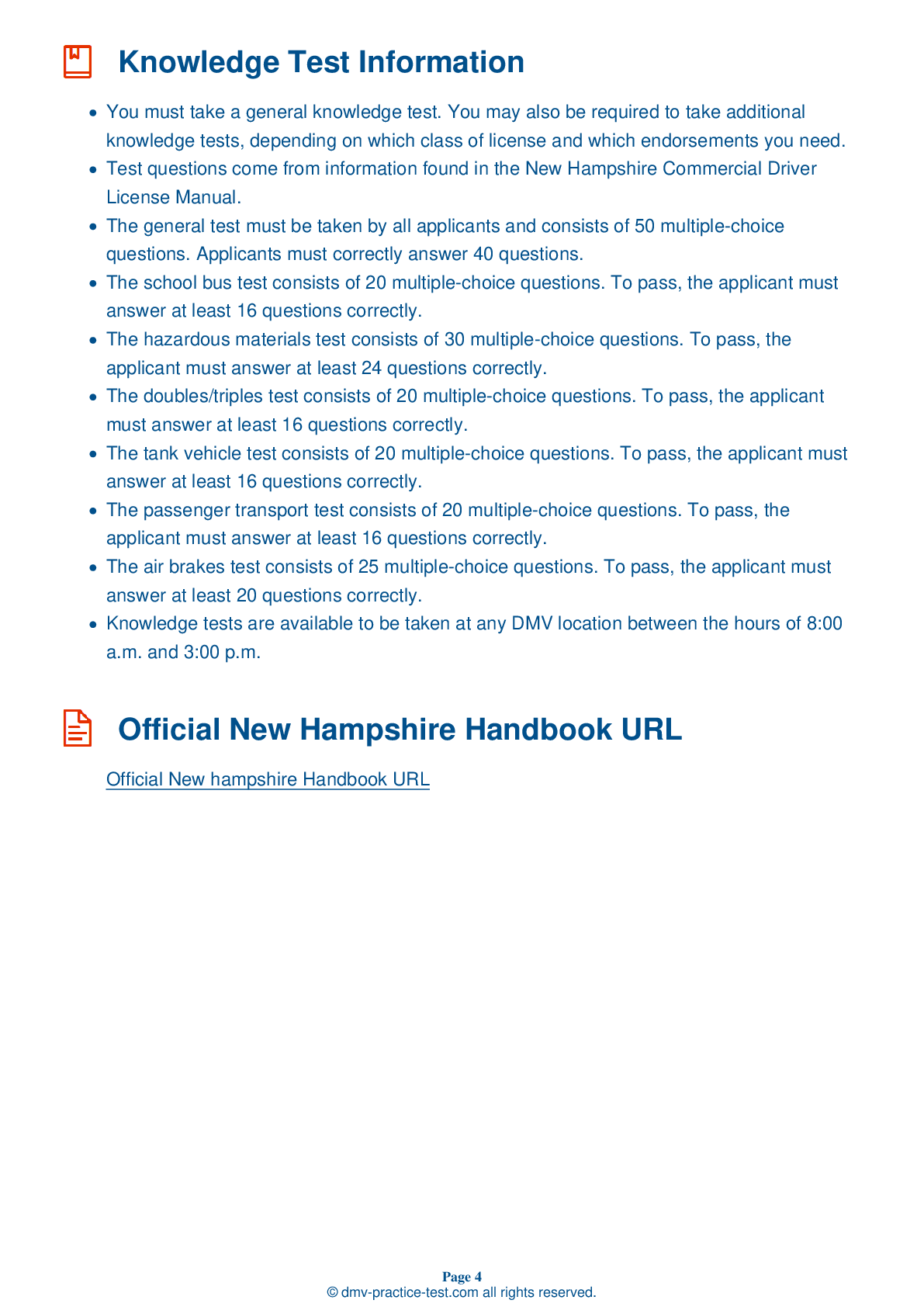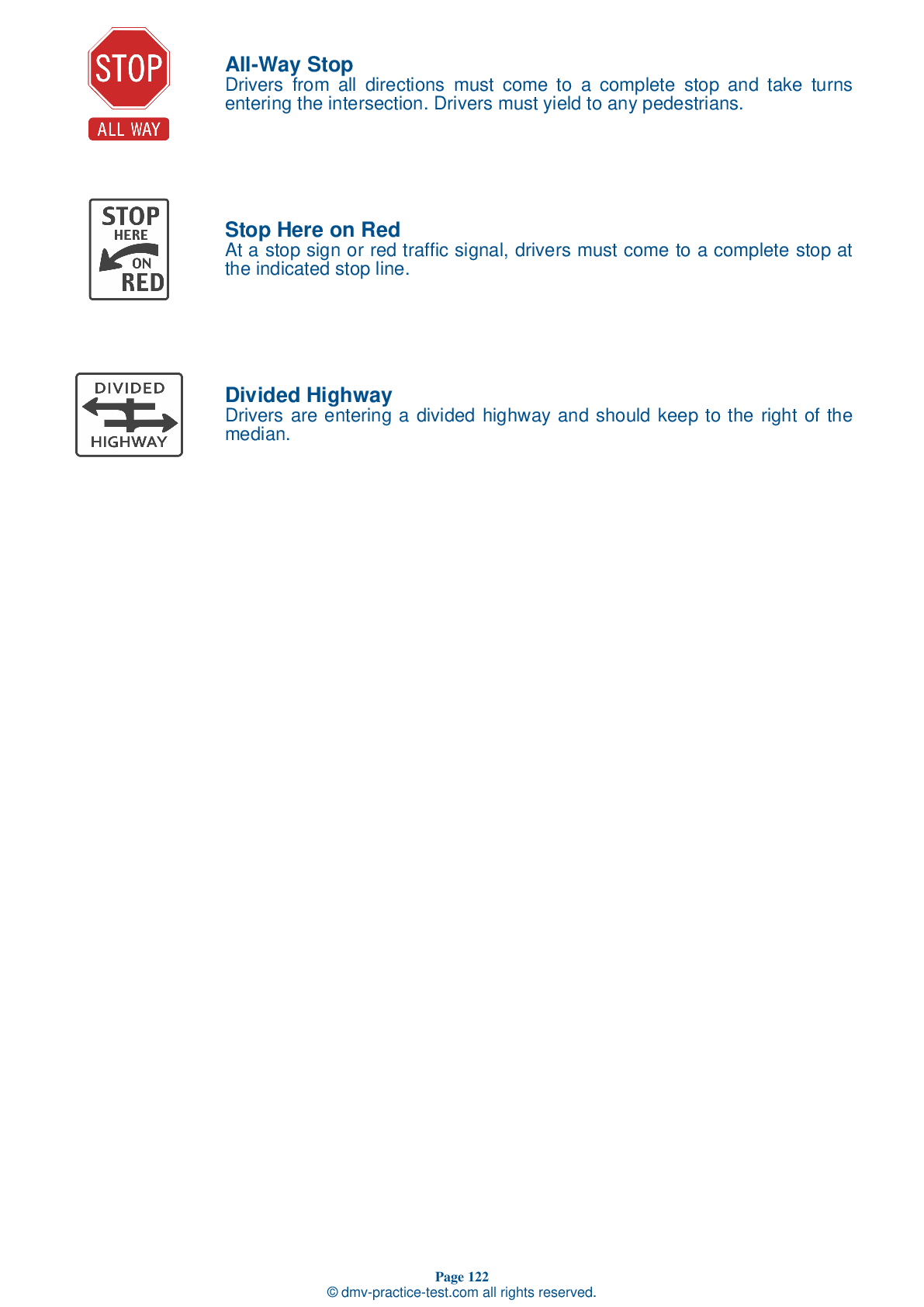Tank #1
Tank Endorsement Test | New Hampshire 2026 #1 Page 2 of 3
Train for FREE with our New Hampshire tank endorsement practice test online. The official exam test consists of several obligatory parts, with all of them checking your knowledge of different blocks of road rules. If you need to obtain a NH tank license in 2026, practice as much as possible. Free sample tests published on our website will help you check and improve your knowledge and boost your grades. Please bear in mind that DMV requirements for issuing a CDL tank vehicle endorsement may vary from state to state.
20
16
20
8 . A pre-trip inspection should include:
Removing a tire.
A pre-trip inspection should include a check of components in the engine compartment, including a check of the engine oil level.
9 . Which of the following is not a strategy to avoid becoming an aggressive driver?
Avoiding gesturing at other drivers
Strategies to avoid becoming an aggressive driver include having realistic expectations about your travel time and the possibility of delays; driving an appropriate speed and keeping a reasonable following distance; avoiding gesturing at other drivers; and keeping your hands on the wheel.
10 . Move over laws require a driver approaching a stopped emergency vehicle to:
Increase their speed.
If an emergency vehicle using its flashing lights is stopped on the side of a multilane road, move over laws require drivers to vacate the lane directly next to the vehicle, if possible. If a driver cannot move over safely, they must slow down and proceed with caution.
11 . After a vehicle is started, the engine oil pressure should come up to normal:
After five minutes.
After a vehicle's engine is started, the engine's oil pressure should rise to its normal level within seconds. Do not drive a vehicle with oil pressure that is too low.
12 . In an emergency, if you must leave the roadway to drive on the shoulder, you should:
Stay on the shoulder until the next exit.
If a hazard requires you to drive onto the shoulder of a road, you should try to keep one set of wheels on the pavement to maintain better control of your vehicle. If possible, stay on the shoulder until your vehicle has come to a complete stop, then pull back onto the road when it is safe to do so.
13 . Who may operate a vehicle that requires placards to be driven?
Any person who thinks they can
You must have a CDL with a HazMat endorsement to operate a vehicle that is used to transport hazardous materials.
14 . If required to complete a vehicle inspection report in writing, the report must be signed:
Only if requested to do so by a law enforcement officer.
You must sign the previous vehicle inspection report only if defects were noted and certified to have been repaired or not needing to be repaired.
2026 New Hampshire | Frequently Asked Questions
A CDL Class A license in New Hampshire is defined as a commercial driver's license that allows the holder to operate any combination of vehicles with a Gross Combination Weight Rating (GCWR) of 26,001 pounds or more, provided the towed vehicle(s) have a GVWR of more than 10,000 pounds. This includes tractor-trailers and truck and trailer combinations.
With a Class A CDL license in New Hampshire, you can operate vehicles such as tractor-trailers, truck and trailer combinations, tank vehicles, livestock carriers, and flatbeds. The license allows you to drive any combination of vehicles with a Gross Combination Weight Rating (GCWR) of 26,001 pounds or more.
To obtain a Class A CDL in New Hampshire, you must be at least 18 years old (21 for interstate driving), possess a valid New Hampshire driver's license, pass a vision test, and successfully complete a written knowledge test. Additionally, you must pass a skills test which includes a pre-trip vehicle inspection, a basic controls test, and an on-road driving examination.
In New Hampshire, you must be at least 18 years old to qualify for a Class A Commercial Driver's License (CDL) for intrastate driving, which means driving only within the state. However, to drive across state lines or handle hazardous materials, you must be at least 21 years old.
Specific endorsements are not required for a Class A CDL license, but they can provide additional privileges. For example, a Hazmat endorsement allows the transportation of hazardous materials, while a Tanker endorsement permits the operation of tank vehicles. These endorsements require additional written exams. The School Bus endorsement requires both written and skills tests.
The Class A CDL skills test in New Hampshire encompasses a pre-trip vehicle inspection to assess your ability to determine if your vehicle is safe to drive. You'll also undergo a basic controls test to evaluate your ability to control the vehicle. Lastly, you'll take an on-road driving examination to demonstrate your practical driving skills in various traffic situations.
Yes, Class A CDL license holders in New Hampshire may face restrictions based on their driving ability or the type of vehicle they tested in. For instance, if a driver takes the test in an automatic transmission vehicle, they'll be restricted to driving automatics. Other restrictions may relate to air brakes, passengers, or hazardous materials.
In New Hampshire, the written Class A CDL test is primarily offered in English. However, some locations may offer the test in Spanish. It's important to note that all CDL applicants must be able to read and speak English well enough to converse, understand traffic signs, respond to official inquiries, and make entries on reports and records.
Yes, individuals with disabilities can request accommodations for the Class A CDL written test in New Hampshire. The Division of Motor Vehicles is committed to complying with the Americans with Disabilities Act (ADA). Accommodations may include extended time, a quiet room, or a reader. Requests should be made in advance to ensure proper arrangements.
Yes, if you fail the Class A CDL written test in New Hampshire, you can retake it. However, you must wait ten days between each attempt. There's no limit to the number of times you can retake the test, but each attempt requires payment of a retest fee. It's advised to study thoroughly before retesting.



